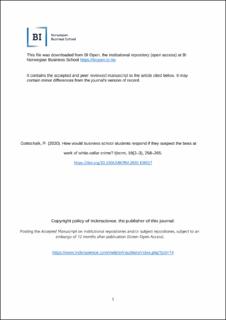| dc.contributor.author | Gottschalk, Petter | |
| dc.date.accessioned | 2021-09-17T15:16:49Z | |
| dc.date.available | 2021-09-17T15:16:49Z | |
| dc.date.created | 2020-06-30T11:20:43Z | |
| dc.date.issued | 2020 | |
| dc.identifier.citation | International Journal of Business Continuity and Risk Management (IJBCRM). 2020, 10 (2/3), 258-265. | en_US |
| dc.identifier.issn | 1758-2164 | |
| dc.identifier.uri | https://hdl.handle.net/11250/2778955 | |
| dc.description.abstract | In this article, we study business school students' action orientation and follower syndrome when they suspect the boss at work of white-collar crime. Business school students are relevant for this research, as they will occupy positions in the future where they can commit financial crime, prevent crime, or become victims of such crime. Our student responses are particularly interesting, since the students actively had elected a class on financial crime rather than more traditional business school classes. Students responded that they would inform a colleague of their suspicion, and they would not raise their suspicion with the boss. Students do not suffer from the follower syndrome in their self-reported scores in the questionnaire. We found no statistical relationship between the extent of the follower syndrome and the extent of action orientation among students. | en_US |
| dc.language.iso | eng | en_US |
| dc.publisher | Inderscience | en_US |
| dc.title | How would Business School Students Respond if They Suspect the Boss at Work of White-Collar Crime? | en_US |
| dc.type | Journal article | en_US |
| dc.type | Peer reviewed | en_US |
| dc.description.version | acceptedVersion | en_US |
| dc.source.pagenumber | 258-265 | en_US |
| dc.source.volume | 10 | en_US |
| dc.source.journal | International Journal of Business Continuity and Risk Management (IJBCRM) | en_US |
| dc.source.issue | 2/3 | en_US |
| dc.identifier.doi | 10.1504/IJBCRM.2020.108517 | |
| dc.identifier.cristin | 1817766 | |
| cristin.ispublished | true | |
| cristin.fulltext | postprint | |
| cristin.qualitycode | 1 | |
